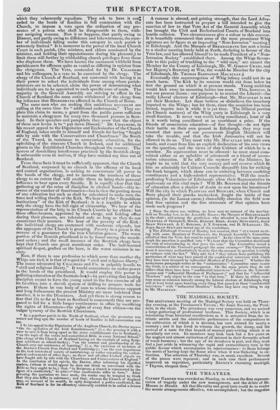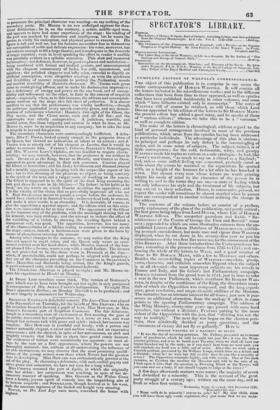TIIE THEATRES.
COVENT GARDEN was crowded on Monday, to witness the first represen- tation of tragedy under the new management, and the data of Mr. MOORE in Hamlet. All that liberality and good taste could do to render the scenic arrangements effective, was accomplished ; but the tragedian to personate the principal character was wanting—to say nothing of the secondary. parts. Mr. MOORE is no raw unfledged aspirant for thea-
trical distinction; he is on the contrary, a sedate, middle-aged man, and appears to have had some experience of the stage : his reading of the part was marked by discretion and intelligence, but he wants the genius to vivify his conception, and physical power to execute it. His figure is tall and well set, but his features are neither fine in themselves nor susceptible of noble and delicate expression: his voice, moreover, has not volume enough to fill a large theatre, and is inadequate to the demands of tragic emotion ; even in level speaking the effort to render it audible was painfully evident in a syllabic utterance. This alow and measured
declamation—not deficient, however, in pod emphases and. modulation—
being combined with formal and studied gesture and Unaccompanied with the eloquent commentary of looks, was cold, monotonous, and spiritless : the polished elegance and lofty mien, essential to dignify an
artificial assumption, were altogether wanting ; as were,the quickness and .flexibility of manner requisite to portray the.sfluetuating moods and morbid sensibility of Hamlet's character. Mr.4'sloont took great
pains to avoid giving offence, and to make his declamation impressive ; but a deficiency of energy and power on the one fused, and of suscep- tibility and refinement on the other, is fatal to the sticcess of acquired talent,—especially when, as in this instance, the address and accomplish- ments current on the stage also fall short of perfection. It is almost needless to say that the performance was wholly ineffective,—though the audience applauded every speech correctly given, and any demon- stration of vehemence whatever : Hamlet's first sight of the Ghost, the Play scene, and the Closet scene, each and all fell flat ; and the catastrophe was utterly unimpressive. A judicious, sensible, and careful actor, free from vulgarity and earnest in what he does, as Mr. Moons: is, must be an acquisition to any company, but to take the lead in tragedy is beyond his powers.
The secondary characters were correspondingly inefficient. A debu- tante, Miss C. Poot.E, looked comely enough in the gorgeous dress of the Queen, but showed no indications of talent as an actress ; and J. VINING was so utterly out of his element as Laertes, that it would be unfair to censure him. FA RUES'S Pu/On llawn.Ey's Gravedigger, and Mrs. WatsrEn Lser's Ophelia, are too familiar to require charae terizing: we may remark, however, that the poformer is too evident in each. Dionisse as the King, Sosno as Horatio, and GREEN as Osrie, appeared to great advantage in their rich costumes. COOPER played
the Ghost as heretofore; and his dusky habiliments and dimmed armour had a mouldy appearance in keeping with the corpse-like aspect of his face : but to this dressing of the phantom we object, as being contrary to the spirit of- the text, and a vulgar mode of working on the senses. The Ghost is supposed to be the spirit of the dead King assuming the look and dress he wore in his lifetime—" .?.ly father ! in his habit as he lived," are the words on which Hamlet describes the apparition; and it is the vitality of the vision that so powerfully impresses all who see
it. Had SuAmesmumlu meant to parade a corpse before the audience, he
would have clothed it in funereal weeds : to dress a dead body in armour, and make it utter words, is an absurdity. It is desirable of course, to
give the apparition a spectral aspect ; and the effects tried on this occa- sion were successful so far as they went. The appearance of the Ghost on the topmost step of the platform, with the moonlight shining full on his armour, was very striking ; and the attempt to imitate the effect of the vanishing of a vision, by showing the receding figure behind a transparent veil, was good. The apparition, however, has too many of the characteristics of a lifelike reality to assume a visionary air on the stage—unless, indeed, a luminousness were given to the form by means of' phosphorus covering the armour.
Among other changes in the costume, we may notice that the King does not appear iii royal robes and the Queen only wears an orna- mental coronet over her bead-Less; while 'Hamlet, instead of the bon-
net phoned like a hearse, wears a cap with a small feather. The dresses are mud pretended to be like those -worn in Denmark at the time— which, if ascertainable, could not perhaps be adopted with propriety : they are of the character prevailing on the Continent in SIIA ESPERE'S time ; Marcellus and Bernardo being attired, like the King's guards, in parti-coloured suits with richly-fashioned halberds. The C/a intestine II suits, is played to-night ; and Mr. MOORE re- peats his experiment in Hamlet on Monday.



























 Previous page
Previous page